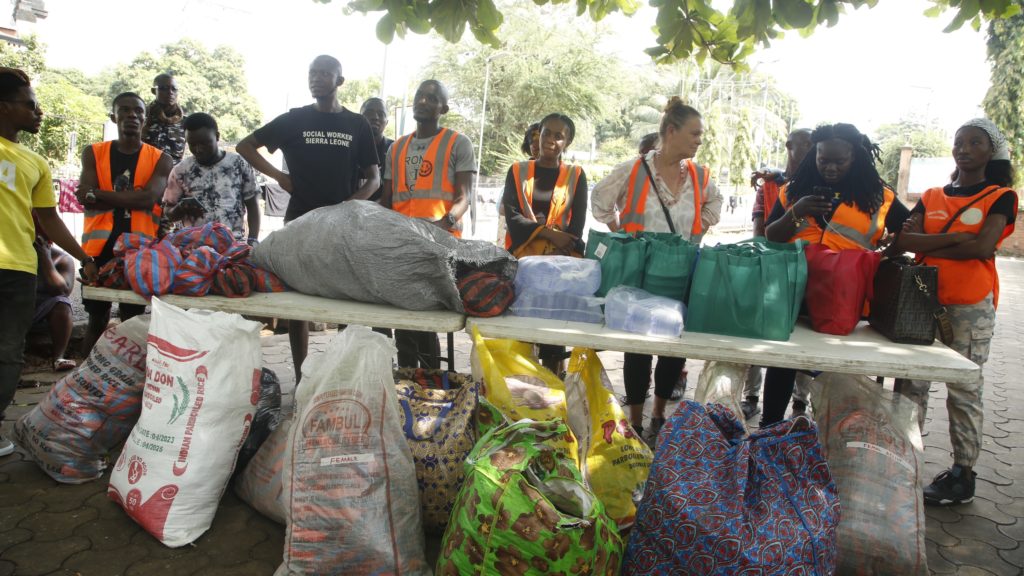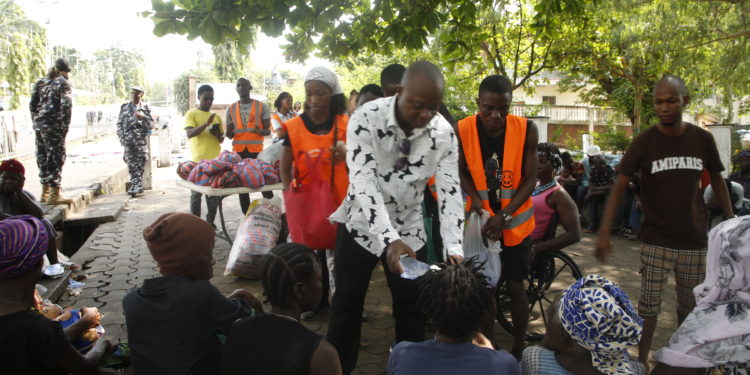By Mohamed Sahr
Social Workers Sierra Leone (SWSL) on Sunday, January 7th launched its 2024 homeless feeding programme with calls for greater government involvement.
The programme which provides food for homeless people in Freetown, one of most neglected segment of the Sierra Leonean society, runs every Sunday of the week.
A group of volunteer social workers walk through the streets of the central business district distributing freshly prepared, hot meal to people who otherwise would only dream of such. Two meals – breakfast and lunch – are served.
The event on Sunday, which was held at the Cotton Tree, the de facto home of a large number of people living with disabilities in the capital city, was also characterised by distribution of used clothing and shoes for the beneficiaries.
SWSL, established in 2012, is dedicated to providing psychosocial support to people in distress. It has also helped in providing relief services, notably during disasters like flooding and mudslides.
The weekly feeding programme, known as the Sunday Feeding Service, was launched in 2018.
Hassan Koroma, Founder and National Coordinator of the volunteer social work organization, said the programme was meant to address a major issue homeless people across the country deal with in silent pain – hunger and malnutrition.
“Part of our mandate as social workers is to care for the vulnerable. And looking at the homelessness population in the country that is not recognized, it is always part of our Sunday programme to capture the plight of these people,” said Koroma.
“Our Sunday Feeding program has helped them immensely by ensuring that food and drinks are given to them on a regular basis,” he added.

Throughout these past six years, SWSL has relied on donations to keep the programme going. Caritas Freetown, the Christian based charity organization which provided rice for the lunch, and Red Lion Bakery, which provided bread for the breakfast service, have been the biggest partners of the programme.
But Koroma says it hasn’t been easy relying on just donation. He wants the government to play a bigger role.
When the Sunday Feeding Service was first conceived, Koroma and his team had in mind people living with mental illness issues. But he says along the way they realized that this category of people is diverse. They include many of the people who live in the streets of Freetown, among them amputees, many of whom are victims of Sierra Leone’s eleven years (1991-2002) civil war.
These people, he says, have one thing in common, the constant stress they go through in their daily lives, which have a toll on their mental health.
According to Koroma, the food is just relationship building through which they seek to address hunger. He notes that they do more than that, including emotional support, facilitating access to healthcare and even helping highly vulnerable individuals with shelter.
The SWSL Founder said in order to be able to run the food service with proper meal and ensure improved wellbeing of the beneficiaries, it will need NLe168, 000 for the whole year.
Sunday’s event was attended by a representative from the Mental Health and Psycho-social Support Directorate in the Ministry of Social Welfare, Ansumana Konneh, who officially launched the 2024 feeding programme.
Mr Konneh pledged the ministry’s commitment to continue working with SWSL as it responds to the need of people living with disabilities.
“I want you to be rest assured that even the President, Julius Maada Bio himself, is committed to supporting people with disabilities,” he said.
“You are no less human beings. You are in this situation because of circumstances. We appreciate SWSL as one of our key partners for working towards improving your standard,” he added.
Kadiatu Sillah, Chairlady of the Cotton Tree Amputees, lamented the sad experience many of them live through on a daily basis, including deprivation, lack of access to medical care and their children exposed to drug abuse.
She revealed that during the past raining season, 18 amputees lost their lives as a result of cold.
“We do not have homes. We are drenched in the rain and most of us fall sick,” Sillah states.
She called on government and institutions as well as people of goodwill to support them to live a better life by providing better housing facility and other basic needs so that homeless can minimize in the country.






















